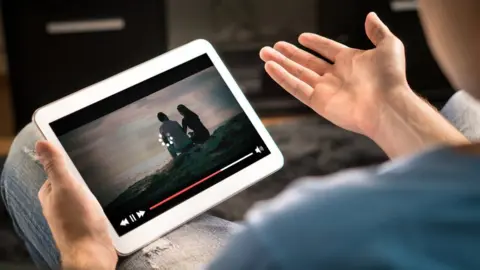Coronavirus: 'Avoid using microwave to get faster internet'
 Getty Images
Getty ImagesPeople should avoid using the microwave at the same time as their wi-fi, media regulator Ofcom has said, as part of advice to help improve internet speeds.
It comes as millions work remotely and rely on streaming services after the UK was told to "stay at home".
This has put pressure on broadband providers, with BT's Openreach reporting a 20% surge in internet use.
The government said reliable internet speeds were "crucial" as the UK battles the coronavirus.
Ofcom's advice ranges from the seemingly obvious, like downloading films in advance rather than streaming them when someone else may be trying to make a video call, to the less expected.
"Did you know that microwave ovens can also reduce wi-fi signals?" Ofcom asks.
"So don't use the microwave when you're making video calls, watching HD videos or doing something important online."
Other tips include:
- Position your internet router as far as possible from other devices that may interfere with the signal, such as on a table or shelf rather than the floor
- Keep your router switched on
- If you're carrying out video calls or meetings, turning the video off and using audio will require much less of your internet connection
- Try starting those calls at less common times, rather than on the hour or half hour
- For the best broadband speeds, use an ethernet cable to connect your computer directly to your router rather than using wi-fi
- Where possible, try not to use a telephone extension lead, as these can cause interference which could lower your speed.
Devices that can interfere with router signals include: cordless phones, baby monitors, halogen lamps, dimmer switches, stereos and computer speakers, TVs and monitors.
Ofcom also advised making calls on a landline where possible, citing an increase in the demand on mobile networks.
"If you do need to use your mobile, try using your settings to turn on wi-fi calling," Ofcom said.
"Similarly, you can make voice calls over the internet using apps like Facetime, Skype or WhatsApp."
The regulator also suggested disconnecting devices that were not in use.
"The more devices attached to your wi-fi, the lower the speed you get," it said.
"Devices like tablets and smartphones often work in the background, so try switching wi-fi reception off on these when you're not using them."
 Getty Images
Getty ImagesOfcom is not the only organisation taking action to maximise internet speeds during the lockdown.
Streaming platforms including Facebook, Netflix, Disney+ and YouTube have already reduced the quality of videos in an attempt to ease the strain on internet service providers.
But the internet companies say they can handle the pressure.
Openreach, which maintains the telephone cables and cabinets across the country used by most broadband providers, said that - despite the jump - usage is still lower than the usual peaks it experiences in the evening.
"We're not seeing any significant issues across our broadband or phone network," an Openreach spokesman said.
"We've seen a circa 20% increase in daytime usage over our fibre network, but that's in line with what we expected and not as high as the usage levels we see during evening peak times."

- LIVE: India lockdown begins
- A SIMPLE GUIDE: What are the symptoms?
- AVOIDING CONTACT: Should I self-isolate?
- STRESS: How to protect your mental health
- LOOK-UP TOOL: Check cases in your area
